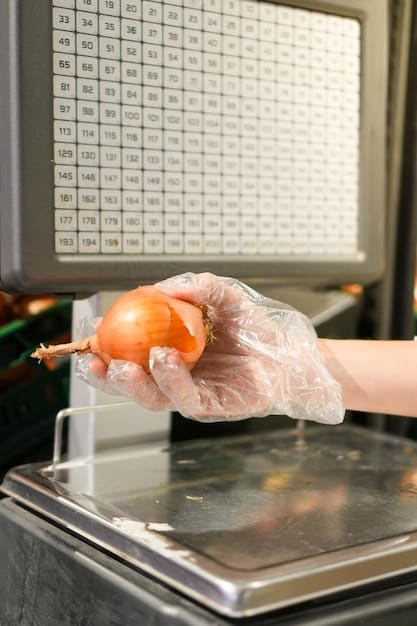New Federal Regulations for Food Safety at Community Events: Avoid Fines in 2025

New Federal Regulations for Food Safety at Community Events: What You Need to Know to Avoid Fines in 2025 are crucial for organizations and individuals involved in community gatherings. Understanding these regulations ensures compliance and helps avoid potential penalties.
Are you planning a community event with food in 2025? It’s essential to stay informed about the New Federal Regulations for Food Safety at Community Events: What You Need to Know to Avoid Fines in 2025. Changes are coming, and being prepared can save you from hefty fines and ensure the safety of your attendees.
This guide will walk you through the key aspects of these new regulations. We’ll cover what you need to know to keep your event compliant and your community safe. Let’s dive in and get you ready for 2025!
Understanding the Impetus Behind New Food Safety Regulations
The landscape of food safety is constantly evolving. In recent years, there has been an increased focus on preventing foodborne illnesses at public gatherings. This has led to a reevaluation of existing guidelines and the introduction of New Federal Regulations for Food Safety at Community Events: What You Need to Know to Avoid Fines in 2025 to better protect public health.
These updates aim to address gaps in previous regulations, enhance transparency, and promote consistent food safety practices across the board. Staying informed about these changes is crucial for event organizers and food vendors alike.
The Growing Concern for Foodborne Illnesses
One of the primary drivers behind these new regulations is the continued prevalence of foodborne illnesses. Community events, where large numbers of people consume food prepared by various vendors, can be breeding grounds for outbreaks if proper safety measures are not in place.
The New Federal Regulations for Food Safety at Community Events: What You Need to Know to Avoid Fines in 2025 seek to mitigate these risks by mandating stricter hygiene standards, temperature controls, and handling procedures.
Key Objectives of the Updated Regulations
- Enhance food safety protocols to reduce instances of foodborne illnesses.
- Provide clearer, more consistent guidelines for community event organizers and food vendors.
- Increase transparency and accountability in food handling practices.
- Ensure that all participants in community events adhere to a uniform standard of safety.
The underlying aim is to create a safer environment for everyone attending community events, ensuring they can enjoy the festivities without worrying about the potential risks of contaminated food. Compliance with these new regulations is key to achieving this goal.

These efforts will require a collaborative approach. Event organizers, food vendors, and regulatory agencies must work together to implement and enforce the new standards. Continuous education and training will also be essential to keep everyone up-to-date with the latest best practices in food safety. Adhering to New Federal Regulations for Food Safety at Community Events: What You Need to Know to Avoid Fines in 2025 fosters community trust and protects public health.
Core Components of the New Federal Food Safety Rules
The New Federal Regulations for Food Safety at Community Events: What You Need to Know to Avoid Fines in 2025 encompass several critical areas to ensure food safety. These include updated guidelines for food handling, preparation, storage, and serving, as well as enhanced inspection and enforcement procedures.
Let’s take a closer look at some of the core components that organizers and vendors need to be aware of.
Updated Guidelines for Food Handling and Preparation
Proper food handling and preparation are paramount in preventing contamination. The new regulations place a strong emphasis on hygiene, sanitation, and the use of appropriate equipment. Vendors must ensure that their staff are well-trained in these areas and follow best practices at all times.
This includes proper handwashing techniques, the use of gloves and hairnets, and the segregation of raw and cooked foods to avoid cross-contamination.
Temperature Control and Storage Requirements
Temperature control is another critical aspect of food safety. Food must be stored at the correct temperatures to prevent the growth of harmful bacteria. The new regulations specify precise temperature ranges for different types of food and outline procedures for monitoring and documenting these temperatures.
- Cold foods must be held at 41°F (5°C) or below.
- Hot foods must be held at 135°F (57°C) or above.
- Use calibrated thermometers to regularly check and record food temperatures.
Enhanced Inspection and Enforcement Procedures
To ensure compliance with the new regulations, regulatory agencies will be conducting more frequent and thorough inspections of community events. These inspections will assess vendors’ adherence to food safety standards and identify any areas of concern. Those who fail to comply with the New Federal Regulations for Food Safety at Community Events: What You Need to Know to Avoid Fines in 2025 could face fines or other penalties. Preparation is key.
Understanding and implementing these core components is essential for maintaining food safety at community events. Event organizers and food vendors must take these regulations seriously and ensure that they are fully compliant to protect public health and avoid penalties.
Practical Steps to Ensure Compliance in 2025
Understanding the New Federal Regulations for Food Safety at Community Events: What You Need to Know to Avoid Fines in 2025 is just the first step. The next, and perhaps more challenging, task is implementing practical steps to ensure compliance. This involves training your staff, updating your equipment, and establishing robust monitoring systems.
Here are some actionable strategies to help you stay on track.
Invest in Comprehensive Staff Training
Your staff are your first line of defense against foodborne illnesses. Investing in comprehensive training programs is essential to ensure they are well-versed in food safety best practices. These programs should cover topics such as hand hygiene, proper food handling, temperature control, and sanitation.
Regular refresher courses are also important to reinforce these principles and keep your team up-to-date with any changes in regulations.
Implement a Robust Monitoring System
Regular monitoring is crucial for identifying and addressing potential issues before they escalate. Implement a system for tracking food temperatures, sanitation levels, and other key indicators of food safety. This system should include checklists, logs, and reporting procedures.
By closely monitoring these factors, you can quickly identify and correct any deviations from established safety standards. The New Federal Regulations for Food Safety at Community Events: What You Need to Know to Avoid Fines in 2025 are designed to ensure these monitoring systems are effective.
Establish Clear Communication Channels
- Create open lines of communication between staff members and management.
- Encourage the reporting of any potential food safety concerns.
- Designate a food safety coordinator to oversee compliance efforts and serve as a point of contact for regulatory agencies.
Regularly Update Your Equipment
Outdated or poorly maintained equipment can pose a significant risk to food safety. Regularly inspect and update your equipment to ensure it is functioning correctly and meeting the highest standards of hygiene. This includes refrigerators, ovens, cutting boards, and utensils.

By diligently following these practical steps, you can significantly reduce the risk of foodborne illnesses at your community event and ensure compliance with the New Federal Regulations for Food Safety at Community Events: What You Need to Know to Avoid Fines in 2025. Proactive measures are always more effective than reactive responses.
Potential Penalties for Non-Compliance
Understanding the consequences of non-compliance is a strong motivator for adhering to the New Federal Regulations for Food Safety at Community Events: What You Need to Know to Avoid Fines in 2025. Failure to meet these standards can result in a range of penalties, from monetary fines to event closures.
Here’s a look at some potential repercussions you might face.
Monetary Fines
One of the most common penalties for non-compliance is monetary fines. The amount of the fine can vary depending on the severity of the violation and the specific regulations that were breached. Repeat offenders may face even higher fines.
These fines can put a significant strain on your budget and undermine your ability to host future events.
Event Closures
In more serious cases of non-compliance, regulatory agencies may order the closure of your event. This can result in significant financial losses, as you may be forced to cancel planned activities and refund ticket purchases.
Event closures can also damage your reputation and make it difficult to secure permits for future events. The New Federal Regulations for Food Safety at Community Events: What You Need to Know to Avoid Fines in 2025 are designed to prevent these scenarios.
Legal Liabilities
If a foodborne illness outbreak occurs at your event due to negligence or non-compliance with food safety regulations, you could face legal liabilities. This could include lawsuits from affected individuals seeking compensation for their medical expenses, lost wages, and other damages.
Legal battles can be costly and time-consuming, and they can severely damage your reputation. Protecting your community with New Federal Regulations for Food Safety at Community Events: What You Need to Know to Avoid Fines in 2025 is vital.
Impact on Future Events and Reputation
Even if you avoid the most severe penalties, non-compliance with food safety regulations can still have a lasting impact on your ability to host future events. Regulatory agencies may be less likely to approve your permit applications, and you may face increased scrutiny and oversight.
Moreover, news of your non-compliance can spread quickly through the community, damaging your reputation and making it difficult to attract attendees and sponsors. Staying compliant with New Federal Regulations for Food Safety at Community Events: What You Need to Know to Avoid Fines in 2025 is essential for maintaining trust and a positive standing in the community.
Resources for Staying Informed and Compliant
Staying informed about the New Federal Regulations for Food Safety at Community Events: What You Need to Know to Avoid Fines in 2025 is an ongoing process. Fortunately, there are numerous resources available to help you stay up-to-date and ensure compliance.
Here are some valuable resources you can consult:
Government Agencies
Federal, state, and local government agencies are excellent sources of information on food safety regulations. These agencies often provide guidance documents, training materials, and other resources to help event organizers and food vendors comply with the latest standards.
Check the websites of agencies such as the Food and Drug Administration (FDA) and the Department of Health and Human Services (HHS) for updated guidelines and announcements.
Industry Associations
Various industry associations offer valuable resources on food safety, including training programs, best practice guides, and compliance checklists. These associations can also provide networking opportunities and connect you with other professionals in the field.
Consider joining organizations such as the National Restaurant Association or the International Food Protection Training Institute for access to a wealth of knowledge and resources.
Online Training Programs
Numerous online training programs are available to help you and your staff stay up-to-date on food safety best practices. These programs often cover topics such as food handling, temperature control, sanitation, and hygiene.
- ServSafe
- National Registry of Food Safety Professionals
Consulting Services
If you need personalized guidance on food safety compliance, consider hiring a consulting service that specializes in this area. These consultants can assess your current food safety practices, identify areas for improvement, and develop a customized plan to help you meet the New Federal Regulations for Food Safety at Community Events: What You Need to Know to Avoid Fines in 2025.
By leveraging these resources, you can ensure that you are well-informed about the New Federal Regulations for Food Safety at Community Events: What You Need to Know to Avoid Fines in 2025. Use all available tools to prioritize the safety of participants and avoid costly penalties.
| Key Point | Brief Description |
|---|---|
| 🛡️ Compliance | Adhere to all guidelines to avoid fines. |
| 🧑🍳 Staff Training | Ensure staff is trained in food safety. |
| 🌡️ Temperature | Monitor and control food temperatures. |
| 📝 Inspections | Prepare for routine food safety checks. |
Frequently Asked Questions (FAQ)
The key changes include stricter guidelines for food handling, temperature control, and sanitation. There’s also enhanced focus on staff training and more frequent inspections to ensure compliance.
The frequency of inspections will vary depending on the location and the nature of the event. However, expect more frequent and thorough inspections to ensure compliance with the New Federal Regulations for Food Safety at Community Events: What You Need to Know to Avoid Fines in 2025.
Food handlers are typically required to have training in basic food safety principles, including hand hygiene, temperature control, and preventing cross-contamination in line with New Federal Regulations for Food Safety at Community Events: What You Need to Know to Avoid Fines in 2025.
Penalties for non-compliance can range from monetary fines to event closures, depending on the severity of the violation and the specific regulations that were breached. Legal liabilities can also occur.
You can find more information on the websites of government agencies like the FDA and HHS. Industry associations such as the National Restaurant Association can also be valuable resources.
Conclusion
Navigating the New Federal Regulations for Food Safety at Community Events: What You Need to Know to Avoid Fines in 2025 might seem daunting, but prioritizing food safety is essential for protecting public health and maintaining the success of your events. Being proactive and well-informed can prevent problems.
By staying informed, training your staff, and implementing robust monitoring systems, you can confidently comply with these new regulations and create a safe and enjoyable experience for everyone involved.





